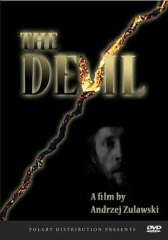
(a.k.a. THE DEVIL)
Once again, Andrej Zulawski puts the "gory" into "allegory" ...
A mysterious bearded man walks into a convent that is acting as an asylum, in the midst of a bloody war in late-18th Century Poland. The man drags his horse through the convent, gasping occasionally at the horrors surrounding him - much screaming, overacting and people caked in blood.
The man makes his way through the sick and the wounded until he meets the eye of a flustered nun. He tells her he's been sent to collect two political prisoners currently being held there, and take them to Warsaw. The nun leads the man to the convent's dungeons, where he shoots one prisoner and tells the other - Jacob (Leszek Teleszynski, THE THIRD PART OF THE NIGHT) - that he's come to rescue him.
Although Jacob does not recognise his saviour or have any idea why this stranger would want to rescue him, he follows his advice regardless and races away from the convent on the horse provided. The nun is sent with him to care for his needs. The only instruction the bearded man gives to Jacob is that he must return directly home.
Jacob's journey across the land exposes him to the destruction caused by war. First he stumbles across a field littered with soldier's corpses, then he runs into a bizarre sex-mad theatrical troupe living in the forest. On both occasions, the mysterious stranger appears at opportune times, spurring Jacob on to his home village.
When Jacob arrives in the village, he's met once again by the stranger, who answers the door to Jacob at the local hall. Together they witness a ball celebrating the marriage of Jacob's childhood sweetheart to a nobleman. Jacob is driven demented with jealousy but before he can take action to reclaim his love, he is chased away by the torch-brandishing partygoers.
Finally managing to elude the angry mob, Jacob and his nun companion eventually make it to his parents' house. Unfortunately the war has also taken it's toll there: father has committed suicide, the family farm has been run into the ground, Jacob's sister has resigned herself to marrying a local dignitary and mother has gone away to make money as a prostitute.
Jacob visits his mother upon the bearded man's suggestion, but their reunion does not go well. Nor does Jacob's second attempt at winning back the heart of his first love. Tormented by how his home has changed and how the war has destroyed his once prosperous land, and egged on relentlessly by the constantly reappearing stranger urging him to cleanse the world of sin, Jacob finally cracks and sees only way to vent his anger and put the world right ...
Throughout DIABEL's various surreal episodes, a bloody war rages on Polish soi - director Andrej Zulawski (ON THE SILVER GLOBE; POSSESSION) filling the screen unrelentingly with gunfire, screaming (if you thought the final act of ALUCARDA had a lot of wailing, just wait until you endure two hours of DIABEL!), poverty, devastation and confusion. It's literally a nightmare unfolding without respite, sucking Jacob - and the viewer - into its increasing state of hysteria.
Much of the onscreen hysteria can be attributed to deliberately OTT performances from a keen-as-mustard cast. Teleszynski impresses as the downtrodden and dazed Jacob, and as the central character he's the only one who's granted a modicum of reservation in his actions (for the first two acts, anyway). Everyone else is so broadly played and over-written that they come across as being simultaneously cartoonish and chilling.
The film's persistent tone of depression and mania lends it a violent edge but, although this is a very angry piece of work that doesn't shy away from throat-slashings and bullets to the face, it's worth noting that it's not the gorefest some mistakenly believe it to be. Approach as a slightly surreal, highly allegorical take on Poland's history of violence and - more broadly - the emotional devastation of war, as told through the language of a zealous arthouse cast and crew, and your expectations should be more accurate.
Polart's disc is a pretty basic affair, but is still worth a closer look.
DIABEL is presented uncut in an aspect ratio that seems to be somewhere between 1.66:1 and 1.33:1. Although the transfer is generally dark with washed-out colours, images are sharp and there's minimal grain evident. For a low-budget Polish film from the early 1970s, it's doubtful how good this film ever looked to begin with. Although far from perfect, Polart's transfer suffices until something better perhaps comes along one day. If you were happy with Second Run's transfer for Zulawski's brilliant THE THIRD PART OF THE NIGHT, then you should have no problem coping with this one.
The Polish mono audio track is served well with a good clear, consistent and hiss-free mix. Removeable English subtitles are easy to read and generally well translated (although the odd spelling error does make the translation occasionally Borat-ish!).
An animated scene-selection menu allows access to the main feature via 18 chapters.
The only extras on offer are filmographies for Zulawski, Teleszynski and co-star Wojciech Pszoniak, plus a gallery of cover art for 43 other titles available through Polart - including MOTHER JOAN OF THE ANGELS and VABANK parts 1 and 2, among others.
DIABEL is an interesting addition to the seemingly bottomless pit of confrontational European cinematic gems from the 1970s that keep getting unearthed. Recommended for anyone with an interest in crazy European arthouse films, and a must for Zulawski fans. Polart's disc is fair if somewhat bare.
Review by Stuart Willis
| Released by Polart |
| Region 1 - NTSC |
| Not Rated |
| Extras : |
| see main review |